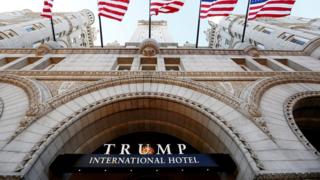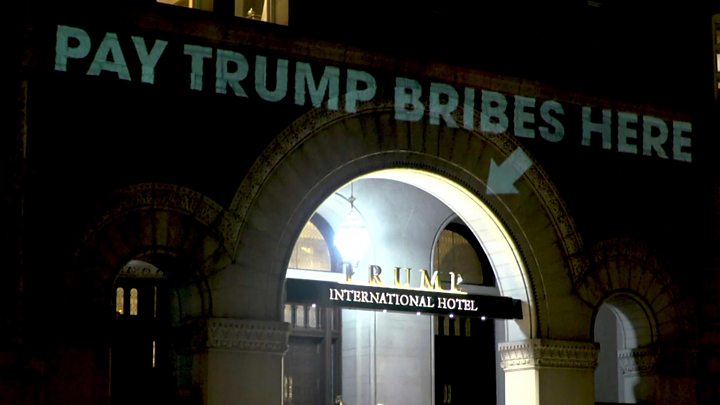 Image copyright
Image copyright
Reuters
The Trump International Hotel in Washington DC is pitched to foreign diplomats as a place to stay
Nearly 200 Democrats in the US Congress have joined forces to file a legal case against President Donald Trump over receipt of payments from foreign governments via his businesses.
The plaintiffs accuse Mr Trump of violating the Constitution’s emoluments clause, prohibiting receipt of gifts without congressional approval.
They say this is the largest number of legislators ever to sue a US president.
State officials and private businesses are suing Mr Trump in similar cases.
The attorneys general of Maryland and the District of Columbia announced their lawsuit on Monday.
The White House has denied their allegations.
Spokesman Sean Spicer said that “partisan politics” could be behind the lawsuit of the attorneys general.
Image copyright
Reuters
Senator Blumenthal says the president is interfering with the constitutional duty of Congress
The justice department declined to comment on the latest suit by legislators, but has said previously it is unconstitutional to sue the president in his private capacity.
At least 30 senators and 166 representatives are involved.
They say Mr Trump has not sought congressional approval for any payments received by his businesses from foreign governments since he took office.
“President Trump has conflicts of interest in at least 25 countries, and it appears he’s using his presidency to maximise his profits,” said Representative John Conyers, quoted by Reuters news agency.
“We do this not out of any sense of pleasure or partisanship, but because President Trump has left us with no other option.”
Sen Richard Blumenthal said: “The president’s failure to tell us about these emoluments… mean that we cannot do our job. We cannot consent to what we don’t know. He’s interfering with our constitutional duty.”

Mr Trump’s worldwide organisation includes more than 500 business entities, including hotels, golf courses and apartment buildings, many of which have done business with foreign governments.
Since taking office in January, Mr Trump has turned day-to-day control of his real estate empire and other assets over to a trust managed by his adult sons.
But he has not sold them off as critics said he should do in order to avoid conflicts of interest.
A non-governmental organisation, Citizens for Responsibility and Ethics in Washington (Crew), lodged a similar legal action in January.
The president’s lawyers have argued the emoluments clause is intended only to stop federal officials from accepting a special consideration or gift from a foreign power and does not apply to payments such as a bill for a hotel room.
Emoluments and presidents
- A section of the US constitution known as the emoluments clause restricts what US presidents can accept from foreign governments
- The clause says “no person holding any office of profit or trust” may accept “any present, emolument, office, or title, of any kind whatever, from any king, prince, or foreign state”
- America’s founding fathers included this to prevent US leaders from being beholden to foreign governments
- Legal analysts say that if the Trump organisation accepts special deals, such as tax breaks or land rights overseas, it could fall foul of the clause. Even overseas profits could potentially be construed as a violation
A list of Trump’s potential conflicts
Trump foreign payments: Democrats in Congress file lawsuit

